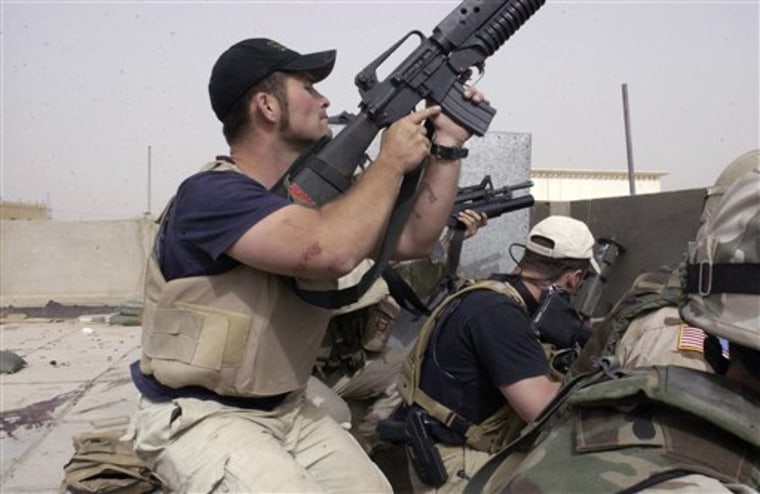The State Department will not renew Blackwater Worldwide's contract to protect American diplomats in Iraq when it expires in May, a senior U.S. official said Friday. The official told The Associated Press that the contract will lapse because of the Iraqi government's decision to deny Blackwater a license to operate.
The Iraqis informed the State Department last week of the denial, which was made amid lingering outrage over a September 2007 shooting in Baghdad's Nisoor Square that left 17 Iraqi civilians dead.
The official said that renewing Blackwater's contract was "basically a moot point because they were not going to be allowed to operate in Iraq anyway." The official spoke on condition of anonymity because the decision has yet to be announced.
The State Department says it is still considering how to protect U.S. diplomats in the wake of the Iraqi denial of Blackwater's operating license.
Officials have said one possibility would be to replace Blackwater with one or a combination of guards from two other U.S.-based security contractors that work for the State Department in Iraq, DynCorp and Triple Canopy. Both have had licenses to operate in Iraq, but it's not clear if they are current or have been renewed.
Blackwater spokeswoman Anne Tyrrell declined to comment on the status of the contract, saying the company understood the State Department "is exploring its options."
"We are awaiting direction from our customer," she said. She stressed that Blackwater had always known that its services in Iraq would be temporary.
Blackwater guards charged
Blackwater executives say the company could leave Iraq within 72 hours of being told to do so, but they cautioned that such a move would cause more harm to the diplomats it protects than to the company itself.
In a Thursday interview with the AP at the firm's North Carolina headquarters, Blackwater founder Erik Prince said he had not received any indication that the company would be ordered to leave in light of the license denial.
The Nisoor Square shooting strained relations between Washington and Baghdad and fueled the anti-American insurgency in Iraq, where many Iraqis saw the bloodshed as a demonstration of American brutality and arrogance. Five former Blackwater guards have pleaded not guilty to federal charges in the United States that include 14 counts of manslaughter and 20 counts of attempted manslaughter.
Blackwater maintains the guards opened fire after coming under attack, an argument supported by transcripts of Blackwater radio logs obtained by the AP. They describe a hectic eight minutes in which the guards repeatedly reported incoming gunfire from insurgents and Iraqi police.
A U.S.-Iraqi security agreement, which took effect Jan. 1, gives the Iraqis the authority to determine which Western contractors operate in their country.
Blackwater has been operating in Iraq without a formal license since 2006. The State Department extended Blackwater's contract for a year last spring, despite widespread calls for it to be expelled because of the shootings.
Sullied brand?
Blackwater's work in Iraq, which includes a reputation for aggressive operations and excessive force it disputes as unfair and inaccurate, turned the company into a catchall brand name for private security contractors. Executives said last year that the unwanted attention had them shifting their focus away from private security.
Executives also acknowledged that losing a contract that comprises one-third of the company's annual revenues could disrupt its growth.
"It would hurt us," Prince told the AP on Thursday. "It would not be a mortal blow, but it would hurt us."
However, Blackwater has also repeatedly said that it performs the contract at the request of the government, noting that while revenues for the contract are high, the margins are low, and the work in Iraq has sullied Blackwater's brand. Executives said this week that they'd prefer to focus on other endeavors, such as international training and aviation support, where they see greater room for growth.
Separate from its State Department work in Iraq, the company trained some 25,000 civilians, law enforcement and military personnel last year. It has a fleet of 76 aircraft, with many of them deployed in Afghanistan and West Africa.
More on: Blackwater Iraq
